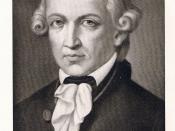The Origins of criminological thought
The Enlightenment
Criminal thought and processes first came into fruition during the enlightenment. This phrase was often used by the writers of the time, who were convinced that they were emerging from centuries of darkness and ignorance into the dawning of a new era enlightened by reason, logic, science, and respect for humanity. The "classical period" is very important as the period provided the first broadly understood theory of criminal behaviour, while still emphasising the need to reform the criminal justice system. More than a set of ideas, the Enlightenment was an attitude, a method of thought. The philosopher Immanuel Kant proposed as the motto of the enlightenment "dare to know!" A desire arose to re-examine and question all received ideas and values, to explore new ideas in many different directions hence the great diversity of 18th century thinkers.
From this period arose the classical school of criminology, composed of such reformers as Marchese di Beccaria, Sir Samuel Romilly, John Howard, and Jeremy Bentham.
It may be said that they sought penological and legal reform rather than criminological knowledge, per se - that is knowledge about crime and criminals. Their principal aims were to mitigate legal penalties and subject judges to the principal aims of nulla poena sine lege or due process of law as well as reduce the application of capital punishment and humanise penal institutions. In all of this they were quite successful, however, in their desire to make criminal justice "just," they attempted to construct rather abstract and artificial equations between crimes and penalties, thereby forgetting the personal characteristics and needs of the individual criminal. Moreover, the object of punishment was seen as being primarily retribution, with deterrence occupying second place, and reformation lagging far behind.
By the second half...


